Page 1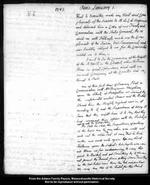
1783.PARIS JANUARY 1
Went to Versailles, made my Visit and Compliments of the Season to M. Le C. de Vergennes and delivered him a Copy of our Treaty and Convention with the States General. He received me with Politeness, made me the Compliments of the Season, tres sincerement, and was sensibly obliged to me for the Copies and invited me to dine.
I went to see the Ceremony of the Knights of the St. Esprit, in the Chappell, where the Queen shone in great Splendour, dined with an immense Company at the Comtes and returned to Paris.
One of these first days of January I had a Conversation with Mr. Benjamin Vaughan, upon the Liberty of Navigation as claimed by the confederated neutral Powers and the Dutch. Shewed him the Necessity England was in, of acceeding to it, and the Importance of doing it soon that they might have it to say, that they had arranged their Affairs with the Dutch, as well as with the United States.
He said he saw the Importance, of pulling at the hairs one by one, when you could not pull out the whole Tail at once. That he had written and would write again to my Lord Shelburne upon the Subject: but says he you can not blame us for endeavouring, to cary this point to Market, and get Something by it. We can not prevent the French from getting some Territory in the East Indies more than they had and perhaps We may buy this of the Dutch for this Point.
Page 2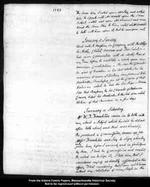
The same day I called upon Mr. Jay, and asked him to speak with Mr. Oswald upon the same Subject, called next upon Mr. Laurens and mentioned the same Idea to him, called at Mr. Oswalds to talk with him upon it, but he was gone out.
JANUARY 5. SUNDAY.
Dined with M. Vaughan, in Company with the Abby de Mably, Chalut, Arnoux and Ter Saint [Tersan]. -- Had more Conversation with de Mably than at any Time before. He meditates a Work upon our American Constitutions. He says the Character he gives of Herodian in his last Work, Sur la maniere d'ecrire L'histoire, has procured to his Bookseller, Purchases, for all the Copies of that Historian which he had in his Shop.Arnoux said that Rousseau, by his Character of Robinson Crusoe, helped his Bookseller to the Sale of an whole Edition of that Romance in a few days.
JANUARY 11 SATURDAY.
Mr. W. T. Franklin came in to talk with me, about a Subject which he said he did not often talk about, and that was himself. He produced a Commission, drawn up, for
Messrs. Franklin and Jay to sign, when they
only were here, before I arrived, and in fact signed by them. I took the Commission and read it. He asked me to sign it. I told him, that I considered myself as directly affronted in this Affair. That considering that I came out to Europe without any Solicitation of mine, single in the
Page 3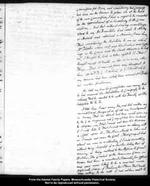
Commission for Peace, and considering that Congress had done me the
Honour to place me at the head of the new Commission, I had a right to be consulted in the Appointment of a Secretary to the Commission. But that without saying or writing a Word to me,
Dr. Franklin had wrote to
Mr. Jay at Madrid and obtained a Promise from him. That considering the Relation to me in which Mr. Thaxter came out, and his Services and Sufferings in the Cause and the small Allowance he had received, I thought he had a better right to it. That I thought
my self ill treated in this as in many other Things. That it was not from any disrespect to him,
Mr. W.T.F., that I declined it. That I should not, if my Opinion had been asked, have named Mr. Thaxter but another Gentleman.
He told me, how his Grandfather was weary, that he had renewed his Solicitation to Congress, to be relieved. That he wanted to be with his Family at Philadelphia &c. &c. &c.
I told him I was weary too, and had written an unconditional Resignation of all my Employments in Europe. That an Attack had been made upon me by the C. de Vergennes, and Congress had been induced to disgrace me. That I would not bear this disgrace if I could help it. That I would wear no Livery with a Spot upon it. The Stain should be taken out or I would not wear the Coat. That Congress had placed me now in a Situation, that I could do nothing without being suspected of a sinister Motive, that of aiming at being restored to the Mission to Great Britain. The Conduct of the American Cause in Europe had been a constant Scramble for Offices and was now likely to be a new and more passionate Scaene of Factions for Places. That I would have nothing to do with it, had not been used to it.
Page 4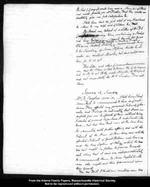
He said that Congress would have now a Number of Places and would provide for Mr. Thaxter. That they would undoubtedly give me full Satisfaction &c.
I told him that the first Wish of my Heart was to return to my Wife and Children &c. that
He shewed me, Extract of a Letter of Dr. F. to Congress concerning him, containing a studied and long Eulogium Sagacity beyond his Years, Diligence, Activity, Fidelity, genteel Address, Facility in speaking French. Recommends him to be Secretary of some Mission, thinks he would make an excellent Minister, but does not propose him for it as yet.
This Letter and other Circumstances convince me, that the Plan is laid between the C. de Vergennes and the Dr., to get Billy made Minister to this Court and not improbably the Dr. to London. Time will shew.
JANUARY 12 SUNDAY.
Mr. B. Vaughan came in. I told him, I had some Facts to communicate to him in Confidence. They affected my personal Interest, Character, and Feelings so intimately, that it was impossible for me to speak of them without being suspected of personal Resentments and sinister Motives. But that these Facts were at the same time so connected, with public Affairs, with the Interests of the House of Bourbon, and with the essential Interests of Great Britain and America and the true System of Policy, which the house two last ought in future to pursue towards each other, that it was my indispensable Duty to communicate them to some English Gentleman who might put their Government upon their Guard.
The two Facts I should now mention were two
Page 5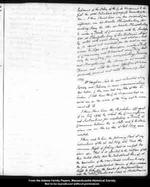
Instances of the Policy of the
C. de Vergennes to defeat the good Intentions of Congress, towards G. Britain. I then
shewed him my two original Commissions -- one as Minister Plenipotentiary for making Peace, the other as Minister Plenipotentiary to make a Treaty of Commerce with the Ambassador or Plenipotentiary of his Britannic Majesty, vested with equal Powers, and whatever shall be so agreed and concluded for Us and in our Name to sign and thereupon make a Treaty of Commerce, and to transact
every Thing that may be necessary for
compleating, securing and strengthening the same, in as ample Form and with the same Effect, as if We were personally present and acted therein, 29. Sept. 1779.
Mr. Vaughan said he was astonished at my Secrecy and Patience, in never communicating this before. That they never had any Idea of this in London. I told him the C. de Vergennes had required me in the name of the King not to communicate it.
I then shew him the Resolution of Congress of 12 July 1781, by which the Commission and Instructions for negotiating a Treaty of Commerce between the U. States and G. Britain given me on the 29. day of Sept. 1779, were revoked.
I then read to him the following Part of my Instructions of the 16. Oct. 1779, vizt. That the common Right of Fishing shall in no Case be given up. That it is essential to the Welfare of all these United States, that the Inhabitants there of, at the Expiration of the War should continue to enjoy the free and undisturbed Exercise of their common Right to fish on the banks of Newfoundland and the other
fishing Banks and Seas of North America.
Page 6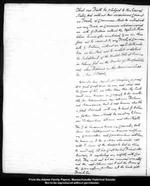
That our Faith be pledged to the Several States, that without their unanimous Consent no Treaty of Commerce shall be entered into nor any Trade or Commerce whatever carried on with G. Britain without the Explicit Stipulation herein after mentioned. You are therefore not to consent to any Treaty of Commerce with G. Britain, without an explicit Stipulation on her Part not to molest or disturb the Inhabitants of the United States of America in taking fish on the Banks of Newfoundland and other Fisheries in the American Seas &c. -- Here I stopped.
You see here says I Mr. Vaughan, a proof of a great Confidence in me. And what was the Cause of it? No other than this, My Sentiments were known in Congress, to be unalterable for Independence, our Alliance, Fisheries and Boundaries. But it was known also to be a fixed Principle with me, to hurt G. Britain no farther than should be necessary to secure our Independence, Alliance and other Rights.
The C. de Vergennes knew my Character, both from his Intelligences in America and from my Conversation and Correspondence with him. He knew me to be a Man who would not yield to some of the designs he had in View. He accordingly sets his Confidential Friend Mr. Marbois, to negotiating very artfully with Congress. They could not get me removed or recalled, and the next Scheme was to get the Power of the Commission for Peace into the hands of Dr. Franklin.
Page 7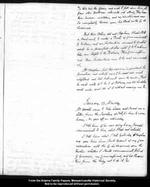
To this End the Choice was made to fall upon him, and four other Gentlemen who could not attend. They have been however mistaken, and no Wrestler was ever so compleatly thrown upon his Back as the C. de Vergennes.
But their Policy did not stop here. I had still a Parchment, to make a Treaty of Commerce with G. Britain, and an Instruction annexed to it, which would be a powerfull Motive with G.B. to acknowledge our Right to the Fisheries. This Commission and these Instructions were to be and were revoked.
Mr. Vaughan said this was very important Information and entirely new. That he [illegible] was much enlightened and had Sentiments upon the Occasion. That he would write it to the E. of Shelburne, and his Lordship would make great Use of it, without naming me, &c.
JANUARY. 13 MONDAY.
Mr. Oswald came to take Leave and shewed me a Letter from the Secretary of State for him to come home. He goes off, on Wednesday.
I told him if he was going home, I would communicate to him, what I had not intended.
I told him what I told Yesterday to Vaughan and gave him some short Account of my Correspondence with the C. de Vergennes, upon the Question whether I should communicate to Lord G. Germain, my Commissions, and his Requisition from the King, not to do it, &c.
Page 8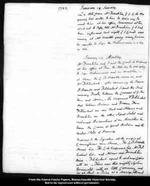
1783. JANUARY 19 SUNDAY.
Received a Note from Mr. Franklin, that the C. de Vergennes had written to him to desire me, to meet him at his office, tomorrow at ten. Went out to Passy, told Mr. Franklin that I had been informed last night, that the Comte was uneasy at Mr. Oswalds going away, because he expected to sign the Preliminaries in a day or two.
JANUARY 20 MONDAY.
Mr. Franklin and I met the Comte de Vergennes at his office at Ten. He told us, he was going to sign Preliminaries and an Armistice. At Eleven the C. D'Aranda came in, and Mr. Fitsherbert. After examining the Papers,D'Aranda and Fitsherbert signed the Preliminary Treaty, between the Crowns of G. Britain and Spain. De Vergennes and Fitsherbert that between Britain and France. Then Fitsherbert on one Part and Adams and Franklin on the other, signed, sealed and exchanged Declarations of an Armistice between the Crown of Great Britain and the United States of America.
Previous to the Signature all the original Commissions were shewn. The C. D'Aranda shewed his. The C. de Vergennes his. Mr. Fitsherbert his -- and Adams and Franklin theirs.Fitsherbert agreed to exchange Copies with Us. -- Thus was this mighty System terminated with as little Ceremony, and in as short a Time as a Marriage Settlement.
Page 9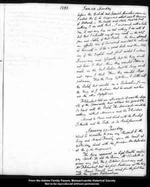
Before the British and Spanish Ministers came in I asked the C. de Vergennes what was to become of Holland. He smiled and said, that We had nothing to do with that. I answered, with a Smile too, it was very true We had nothing to do with it, but that I interested myself very much, in the Welfare and Safety of that People. He then assumed an affected Air of Seriousness and said he interested himself in it too a good deal, and then told me, that the English had first wished to retain Demerary and Essquibo, but the King would not hear to that. Then they wanted Trincamale in the East Indies. But the King would not agree to that. Then they wanted Negapatnam. This the King left them to settle with the Dutch, but insisted on a Declaration from the King of G. Britain that he would restore all the other Possessions.
Fitsherbert told me afterwards it was the Severity of the Spaniards, that obliged his Court to be so hard with the Dutch. The Spaniards would do nothing without Minorca and the Floridas.
Returned to Paris and dined with the Duchess D'Anville and the Duke de la Rochefaucault.
JANUARY 21. TUESDAY.
Went to Versailles to pay my Respects to the King and Royal Family, upon the Event of Yesterday. Dined with the foreign Ambassadors at the C. de Vergennes's.
The King appeared in high Health and in gay Spirits: so did the Queen.M. [Madame] Elizabeth is grown very fat. The C. D'Artois seems very well.Mr. Fitsherbert had his first Audience of the King and Royal Family and dined for the first time with the Corps Diplomatique.
Page 10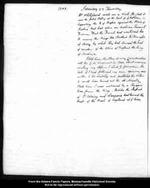
1783, JANUARY 23. THURSDAY.
Mr. Whitefoord made me a Visit. He said it was the fatal Policy of the Earl of Chatham, in supporting the K. of Prussia against the House of Austria, that had given an Austrian Queen to France. That the French had contrived too to marry the Kings two Brothers to Princesses of Savoy, by which they had damped the Zeal of another of the Allies of England the King of Sardinia.
I told him the Story of my Correspondence with the C. de Vergennes in 1780, about communicating my Mission to Lord G. Germain. He said if I had followed my own Opinion, and written to his Lordship and published the Letter, it would have turned out the old Ministry. I told him I was restrained by a Requisition from the King. Besides the Defeat of D'Estaing and Langara, had turned the Heads of the People of England at that time.
Page 11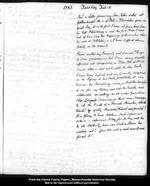
1783 TUESDAY. FEB. 18.
Received a Letter from my Son John, dated at Gottenburgh the 1 of Feb. This Letter gave me great joy, it is the first I have received from him since he left Petersbourg, and the first News I have had of him since the Beginning of December, when he was at Stockholm. I have suffered extream Anxiety on his Account.
I have omitted my journal, and several Things of some Consequence, but I am weary, disgusted, affronted and disappointed. This State of Mind I must alter -- and work while the day lasts.
I have been injured, and my Country has joined in the Injury. It has basely prostituted its own honour by sacrificing mine. But the Sacrifice of me for my Virtues, was not so servile, and intollerable as putting Us all under Guardianship. Congress surrendered their own Sovereignty into the Hands of a French Minister. Blush blush! Ye guilty Records! blush and perish! It is Glory, to have broken such infamous orders. Infamous I say, for so they will be to all Posterity. How can such a Stain be washed out? Can We cast a veil over it, and forget it?
Page 12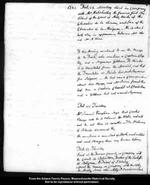
1783 FEB. 24 MONDAY.
Dined in Company with Mr. Malesherbes, the famous first President of the Court of Aids, Uncle of the Chevalier de la Luzerne, and Son of the Chancellor de la Moignon. He is about half Way in Appearance, between Mr. Otis and Mr. A. Oliver.
F. [Franklin] this Morning mentioned to me the Voyage de la Fonte, who mentions a Captain Chapley, and a Seymour Gibbons. F. thinks it is translated from the Spanish, and that the Translator or Printer has put Seymour for Seignor. He had once a Correspondence about this Voyage, and Mr. Prince found there had been a Captain Chapelet at Charlestown and a Gibbons but not named Seymour.
FEB. 25. TUESDAY.
Mr. Samuel Vaughan says that Cooks Voyage will be 3 Volumes 60 Plates, and will not be out these 12 Months. The Plates are of Islands discovered &c.
He mentions a new Sort of Bark, much redder and much stronger, than any known before.
FEB. 27. THURSDAY.
Dined at the Farmer Generals, in Company with the Comte de Polastron, Father of the Duchesse de Polignac. No Friend of D'Estaing.
Spent the Evening in Company with the Abby de Mably, some other Abbys and
Accademicians.
Page 13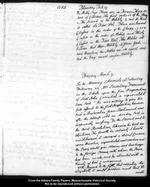
De Mably says There are in France Three Orders of Citizens. The first Order is of the Clergy. 2. The Second of the Nobility. 3. And the third is called Le Tiers Etat. -- There are several Classes in the Order of the Clergy, 7 or 8 Classes in the Order of Nobles, and Thirty Classes in the Tiers Etat. The Nobles all believe that their Nobility is from God. And therefore, the Nobles are all equal, and that the King cannot confer Nobility.
FRYDAY MARCH 7.
In the Morning Chronicle of Saturday February 22, Mr. Secretary Townsend in the Debate upon the five Propositions of Lord John Cavendish, is represented to have said He was willing to give his full Assent to the first Proposition, because such a Declaration from Parliament was, after the Address voted on Monday last, indispensably necessary. To the second, and to the third Resolutions, likewise he had no Objections. The fourth he certainly should resist, because it conveyed a direct Censure upon Ministers, reprobated and condemned the Peace, would give Alarm and Umbrage to the foreign Powers, with whom the Peace had been made, and be attended with a Variety of bad Consequences.
"With Regard to the fifth, that respecting the Loyalists, it would produce much Evil. It would
Page 14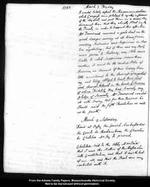
It would totally defeat the Recommendations which Congress were pledged to make in
favour of the Loyalists, and put them in a worse Predicament than that they already stood in, by the Treaty. In order to support this Assertion Mr. Townsend reasoned a good deal on the great danger arising at all times from creating Jealousies and Suspicions in Parties negotiating; but if there was any Party more prone to jealousy, any State more liable to catch Suspicion sooner than another, it must be the United States of America, on Account of their having been little accustomed to the Business of negotiating, and
being obliged to trust their first and dearest Interests in the hands of Persons of whose Fidelity they had scarcely any pledge o f Security. Mr. Townsend concluded with saying, that for these Reasons he should resist the fifth Resolution as well as the fourth."
MARCH 9 [i.e. 8] SATURDAY.
Dined at Passy, the Spanish Ambassador, the Comte de Rochambeau, the Chevalier de Chatelux [Chastellux], Mr. Jay &c. present.
Chatelux said to the Abby Morlaix that I was the Author of the Massachusetts Constitution, and that it was the best of em all, and that the People were very contented with it.
Page 15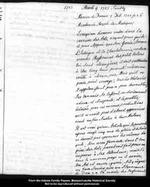
MARCH 9. 1783 SUNDAY.
Mercure de France 1. Feb. 1783, p. 26
Academie Royale de Musique.
Lorsqu'un homme entre dans la carriere des Arts, n'ayant pour guide et pour Appui que son Genie; lorsque L'Intrigue et la Charlatanerie, ces deux grandes Ressources des petits talens, lui sont etrang res, il doit s'attendre tre long tems persecut, m connu, arr t chaque pas. Mais qu'il ne perde point courage; tous les Obstacles s'applanissent peu -- a -- peu devant lui; ses Ennemis se lassent ou deviennent odieux et suspects; et le public, clair par ces memes productions qu'il n'avoit pas d'abord appreciees, rend enfin justice leur Auteur.
Il est vrai qu'un Artiste qui se presente apres vingt -- cinq ans de gloire et de Succ s ne devroit pas eprouver les m mes degouts; son nom fameux dans l'Empire des Arts, paroitroit fait pour en imposer ses d tracteurs; mais si dans le nouveau pays ou il arrive, son Art est encore ignor; s'il y r gne un faux Savoir, pire que L'Ignorance; si l'on y a la manie des Preferences,
Page 16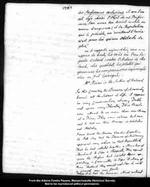
des
Preferences exclusives, et que l'on ait dej choisi l'Objet de ces Preferences, son nom lui devient inutile ou meme dangereux; et la Reputation qui le pr ced, en veillant l'Envie, n'est pour lui qu'un Obstacle de plus.
On se rappelle aujourd hui, avec une espece de honte, les exc s o l'on se porta d'abord contre l'Auteur de Roland. Les quolibets, les plattes Epigrammes, les comparaisons injurieuses, rien ne fut pargn.
Mr. Picini [Piccinni] is the Author of Roland.
In this Country, the Demon of Monarchy haunts all the Scaenes of Life. It appears in every Conversation, at every Table and upon every Theatre. This People can attend to no more than one Person at a Time. They can esteem but one, and to that one their Homage is Adulation and Idolatry.
I once heard the Baron Van der Capellen de Poll say that the Daemon of Aristocracy appeared every where in that Republick. That he had collected together a Number of Merchants to sign a Requ te. They agreed upon the Measure but insisted upon appointing a Committee to sign it. Many of them declared they would not sign it, with a Crowd, avec une foule.
Thus it is that the human Mind contracts
Page 17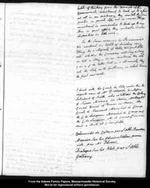
habits of thinking from the Example of the
Gouvernment. Accustomed to look up to a few as all in an Aristocracy, they imitate the same practice in private Life, and in common Things. Accustomed in monarchies to look up to one Man in great Affairs, they contract a similar disposition in little ones.
In the same manner in Democracies We contract an habit of deciding every Thing by a Majority of Votes. We put it to vote whether the Company will sing a Song or tell a Story. In an Aristocracy they ask 2 or 3 of the better Sort. In a Monarchy they ask the Lady or the Gentleman, in whose honour the feast was made.
I dined with the Comte de Pilo, under the Incognito name of Mr. D'Olavide, heretofore Intendant of Seville who established the Colony of Sierra Morena in Spain, Mr. Boystel Consul General of France in Spain, the Comte de Jaucourt Marechal de Camp, the C. de Lusignem M. de Camp and the C. de Langeron M. de Camp, Commandant a Brest, at C. Sarsefields.
Ephemerides du Cytoyen par L'Abbe Baudau.
Memoire sur les Administrations provincials par Mr. Throne.
Dialogue sur les Bleds par L'Abbe Galliany.
Page 18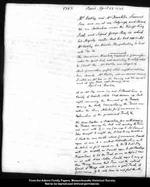
1783 PARIS APRIL 27. 1783.
Mr. Hartley met Mr. Franklin, Laurens, Jay and me, at my Lodgings, and shewed Us an Instruction under the Kings Privy Seal, and signed George Rex, in which his Majesty recites that he had appointed Mr. Hartley his Minister Plenipotentiary to treat with Us &c.
The American Ministers unanimously required a Commission under the great Seal, and promising to ratify what he should do. -- Mr. Hartley was chagrin'd.
Much Conversation passed, which might as well have been spared. Mr. Hartley was as copious as usual. I called on Mr. Jay in the Evening and We agreed to meet at my House next Morning at 10.
APRIL 28. MONDAY.
At 10 Mr. Jay came in, and I shewed him a Variety of Projects, which I had drawn up last night, concerning the Removal of the Troops, opening the Ports, tranquilizing the Tories now within the Lines, Articles for Commerce, in Explanation of the provisional Treaty &c.
We drew together a Proposition, for withdrawing the Troops, opening the Ports and quieting the Tories, and went with it in my Carriage to Mr. Laurens, who thought it might do. I said to my Brothers, I shall be very ductile about Commerce. I would agree at once to a mutual Naturalization, or to the Article as first agreed on by
Dr. F. and
Mr. Jay with
Mr. Oswald, or I would agree to Mr. Hartleys Propositions, to let the Trade go on as before the War or as with Nova Scotia. I could agree to any of these Things because that Time and the natural Course of Things will produce a good Treaty of Commerce. G.B. will soon see and feel the
Page 19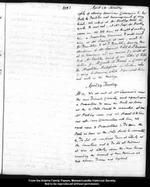
Necessity of alluring American Commerce to her Ports, by Facilities and Encouragements of every kind. We called at Mr. Hartleys Hotel de York. He was out. At
Mr. Jays, Mr. Hartley came in. We told him, We thought of making him a Proposition, tomorrow, and would meet him at Mr. Laurens's at one. Wrote to
Dr. Franklin and W. T. Franklin, desiring their Attendance at Mr. Laurens's Hotel de L'Empereur at 11. tomorrow. Received an Answer that they would attend. Mr. Hartley desired of me Letters of Introduction for Il Comte di Ferm a Cousin of the Neapolitan Ambassader in London, who is going to America, which I promised him and wrote in the Evening.
APRIL 29. TUESDAY.
At 11, We all met at Mr. Laurens's near the new French Comedy, and agreed upon a Proposition to open the Ports as soon as the U. States should be evacuated. At one Mr. Hartley came and We shewed it to him, and after some Conversation with him, We agreed upon 3 Propositions. 1. To open the Ports as soon as the States should be evacuated. 2. To set all confined Tories at Liberty at the same time and 3. To set all Prisoners of War at Liberty, upon the same terms respecting the Accounts of their Expences as those between France and England.
Page 20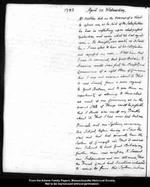
1783. APRIL 30. WEDNESDAY.
Mr. Hartley did me the
Honour of a Visit to assure me, as he said of the Satisfaction he had in reflecting, upon what passed Yesterday, and upon what We had agreed upon. He thought
it was exactly as it should be. I was glad to hear of his Satisfaction and expressed my own. I told him that I was so convinced, that Great Britain and America would soon feel the Necessity and Convenience of a right Plan of Commerce that I was not anxious about it. That it was simply from a pure regard to Great Britain, and to give them an opportunity of alluring to themselves as much of our Commerce, as in the present State of Things would be possible, that I should give myself any Trouble about it. That I had never had but one Principle and one System, concerning this Subject, before, during or since the War, and that had generally been the System of Congress viz. That it was not our Interest to hurt Great Britain any further than was necessary to support our Independence and our Alliances. That the French Court had sometimes endeavoured to warp us from this System, in some
Page 21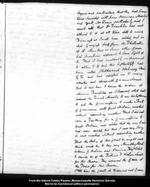
degrees and particulars, that they had sometimes succeeded with some American Ministers and Agents, Mr. Deane particularly, and I must add that
Dr. Franklin had not adhered to it at all times with so much Firmness as I could have wished, and indeed Congress itself from the Fluctuation of its Members, or some other Cause had sometimes appeared to loose Sight of it. That I had constantly endeavoured to adhere to it, but this Inflexibility had been called Stubbornness, Obstinacy, Vanity &c. and had
expossed me to many Attacks, and
disagreable Circumstances. That it had been to damp the
Ardour of returning Friendship as I supposed, which had induced the French Minister, to use his Influence to get the Commission to make a Treaty of Commerce with Great Britain, revoked without appointing another. That I did not care a Farthing for a Commission to Great Britain, and wished that the one to me had never existed, but that I was very sorry it was revoked without appointing another. That the Policy of this Court he might well think would be, to lay every stumbling Block between G. Britain and America. They Wished to deprive Us of the Fisheries and Western Lands for this Reason. They espoused the Cause of the Tories for this Reason.
I told him the
Comte de Vergennes and I were
Page 22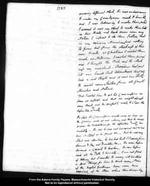
pursuing different Objects. He was endeavouring to make my Countrymen meek and humble and I was
labouring to make them proud. I avowed it was my Object, to make them hold up their Heads, and look down upon any Nation that refused to do them justice. That in my Opinion Americans had nothing to fear, but from the Meekness of their own Hearts. As Christians I wished them Meek, as Statesmen I wished them proud, and I thought the Pride and the Meekness very consistent. Providence had put into our hands such Advantages, that We had a just Right and it was our Duty to insist upon justice from all Courts, Ministers and Nations.
That I wished him to get his Commission as soon as possible and that We might discuss every Point and be perfectly ready to sign the definitive Treaty.
He said his Commission would come as soon as the Courier could go and return, and that he would prepare his Propositions for the definitive Treaty, immediately. He said he had not imagined that We had been so stout as he found Us. -- But he was very silent and attentive. He has had hints I suppose, from Laurens and Jay, and Franklin too. He never before discovered a Capacity to hearken. He ever before took all the Talk to himself. I am not fond of talking, but I wanted to convey into his Mind a few Things, for him to think upon. None of the English Gentlemen have come here apprized of the Place where their danger lay.
Page 23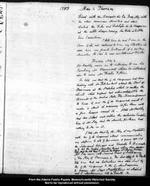
1783 MAY 1 THURSDAY.
Dined with the Marquis de la Fayette, with the other American Ministers and others.
Visited the Duke and Dutchesse de la Vauguion at the petite Luxembourg. The Duke is to stay here some time.
I told him he and I were in the same Case, and explained to him my Situation and gave him my frank Sentiments of a certain Minister. He said he was veritablement touch.
FRYDAY. MAY 2.
Mr. Hartley came in to introduce to me his Secretary Mr. Hammond, whom he introduced also to mine, Mr. Thaxter and Storer.
He told me that the C. de Vergennes had been treating with Mr. Fitsherbert about the Post of Panmure at the Natches, which is within the Limits which England has acknowledged to be the Bounds of the United States. The Spaniards want to keep it, and the C. de Vergennes wants to make a Merit of procuring it for them with a few Leagues round it. -- I told Mr. Hartley that this Subject was within the exclusive jurisdiction of Mr. Jay. That the Minister for Peace had nothing to say in it.
I told Mr. Hartley the Story of my Negotiations with the C. de Vergennes about communicating my Mission to Ld. G. Germaine 3 Years ago and the subsequent Intrigues and Disputes &c. It is necessary to let the English Ministers know where their danger lies, and the Arts used to damp the Ardour of returning friendship.
Mr. Jay came, with several Pieces of Intelligence. 1. The Story of Panmure. 2. The Marquis de la Fayette told him that no Instructions were ever sent by the C. de Vergennes to the C. Montmorrin to favour Mr. Jays Negotiations at Madrid and that Montmorrin told la Fayette so.
Page 24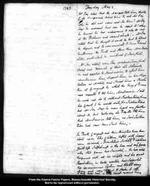
Mr. Jay added that the Marquis told him, that the C. de Vergennes desired him to ask Mr. Jay why he did not come and see him? Mr. Jay says he answered how can he expect it? when he knows he has endeavoured to play Us out of the Fisheries and vacant Lands? Mr.Jay added that he thought it would be best to let out by degrees, and to communicate to some French Gentlemen, the Truth and shew them Marbois's Letter. Particularly he mentioned C. Sarsefield.
Mr. Jay added, every Day produces some fresh Proof and Example of their vile Schemes. He had applied to Montmorin, to assist him, countenance him, support him, in his Negotiation at Madrid, and shewed him a Resolution of Congress by which the King of France was requested to Aid him.Montmorin said he could not do it, without Instructions from his Court, that he would write for Instructions, but Mr. Jay says he never heard any farther about it. But Yesterday La Fayette told him that Montmorin told him, no such Instruction had ever been sent him.
In Truth Congress and their Ministers have been plaid upon like Children, trifled with, imposed upon, deceived. Franklin's Servility and insidious faithless Selfishness is the true and only Cause why this Game has succeeded. He has aided Vergennes with all his Weight, and his great Reputation, in both Worlds, has supported this ignominious System and blasted every Man and every Effort to shake it off. I only have had a little Success against him.
























